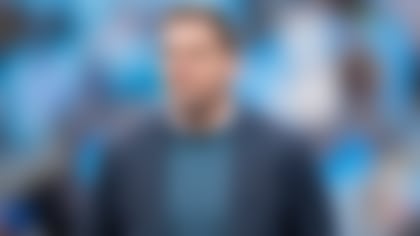It was late, and he'd probably had a few, but Jerry Jones spoke for a lot of owners one night in 1993 when he said "any one of 500 coaches could have won" the two Super Bowls claimed by the Dallas Cowboys under coach Jimmy Johnson.
The obvious message was that this is a general manager's league, and coaches don't really matter much in pro football.
It's an age-old debate. As I've said before, coaches probably aren't as important as we like to think we are. But a coach's role -- in setting both the tone in the locker room and the expectations for his players -- can be crucial when it comes to changing the fortunes of a team.
Exhibit A: the Kansas City Chiefs.
Last year, the Chiefs had the worst season in their history; in fact, considering the Jovan Belcher tragedy, it was perhaps the worst season in any team's history.
Kansas City failed to hold a single lead in regulation during any of its first eight games en route to a 2-14 finish. The home-field advantage of Arrowhead Stadium -- which, for much of the 1990s and 2000s, was considered one of the loudest, toughest venues for visitors to play in -- was reduced to a joke. All opponents had to do was force one three-and-out and the boos would start. Fans had grown impatient, given so many instances of football incompetence.
What a difference a year makes. Now, as we head into Week 4 of the 2013 NFL season, the Chiefs are one of seven undefeated teams in the league. New coach Andy Reid, brought over after 14 years with the Philadelphia Eagles, hasn't just changed the offense; he's changed the culture.
Throughout training camp, Chiefs players marveled over Reid's remarkable attention to detail, his focus on teaching the small nuances of the game. Ceding many of the personnel duties he'd held in Philadelphia to new Chiefs general manager John Dorsey, Reid was free to do what he does best: coach football players. And the experience and authority he brought to the situation was decisive.
Players must know they are accountable to the head coach; the importance of that can't be overstated. Of course, the owner obviously is the ultimate authority on any team, because the money being spent is his. And in the age of the salary cap, the NFL is more of a general manager's league than ever before. Still, both owner and GM must give the head coach autonomy regarding game-day decisions and allow him to be vested in the larger personnel process; otherwise, the coach loses any chance of truly leading the team.
In recent years, former Chiefs GM Scott Pioli -- in true New England Patriots style -- was the ultimate authority, and he made sure everyone knew it. As a result, former coaches Todd Haley and Romeo Crennel appeared emasculated in the eyes of their players. That obviously is not the case in Kansas City now.
Of course, teams also need good football players, and the Chiefs (who sent six players to the 2013 Pro Bowl) already had a few. One of the first things Reid and Dorsey did was trade for San Francisco 49ers quarterback Alex Smith, replacing the willing but overmatched Matt Cassel. Reid and Dorsey knew exactly what they were getting. Smith won't consistently hurt opponents with deep passes, but he's an above-average NFL quarterback who rarely panics, has superior decision-making skills and runs well enough to be a maddening nuisance to defenses. Smith also might be the purest West Coast offense quarterback Reid has ever coached. Consider this: Last year, after three games, the Chiefs had committed nine turnovers; this year, they've committed none (making them the first team since 1998 to begin the season with three consecutive turnover-free games).
So good things are happening in Kansas City. We know that when things are going poorly, a team's inertia can spark divisiveness and complaining among players. But the opposite effect also exists: When a coach has established a record of success and his team has bought in, players often rise above personal grievances.
Dwayne Bowe, the Chiefs' star receiver, wound up with one catch for 4 yards last Thursday after being double-covered for much of the contest. But he wasn't complaining about it on the sideline, as Antonio Brown reportedly did during the Pittsburgh Steelers' Week 2 defeat. Instead, Bowe stayed positive and helped the team. When the final gun went off, the smiling receiver was among the first players to congratulate Reid. That's not merely a sign of Bowe's increased maturity; it's evidence that the team's key players believe in their coach.
The defense, which had shown flashes of promise for years, seems to be maturing under new coordinator Bob Sutton, who has been able to get consistent pressure on quarterbacks without sending a bunch of extra defenders. There aren't many new faces on the unit; Pro Bowl linebacker Derrick Johnson is anchoring the middle, and safety Eric Berry is returning to his status as a game-changing safety. The secondary is stronger, with new additions Sean Smith and Dunta Robinson joining cornerback Brandon Flowers. Flowers is a battler; at 5-foot-9, he is sometimes vulnerable against tall receivers (Dallas Cowboys star Dez Bryant gave Flowers fits in Week 2), but he remains among the better pure cover corners in the league.
Justin Houston got most of the headlines after Reid's homecoming win in Philadelphia last Thursday, collecting 4.5 sacks. But the key to the Chiefs' defense has been the maturation of second-year nose tackle Dontari Poe. After losing 20 pounds during the offseason, the big defender now possesses a daunting combination of size and speed; he overpowers centers, eats up the interior run game and often gets inside pressure on the quarterback.
Finally, Dustin Colquitt, the strong punter who went to his first Pro Bowl after the 2012 season, consistently has pinned back opponents. Chiefs foes have begun 31 of their 40 drives this season (more than 77 percent) at or inside their own 20-yard line. Few opponents will be able to mount many drives of 80-plus yards against the Chiefs and their front seven this year.
Just how good is Kansas City? It's early, but if Jamaal Charles stays healthy, the Chiefs will be in nearly every game -- though the jury still is out as to how far into the playoffs Alex Smith can be trusted to take this team.
Power Rankings: Bona fide Bears
Elliot Harrison had his doubts about the Bears -- but then they started 3-0. Who else has revealed their true nature? **More ...**
Still, over only one offseason, Kansas City has gone through a transformation. The Chiefs might have a tough time overtaking the Denver Broncos in the AFC West. But with extra time to prepare for the struggling New York Giants in Week 4, followed by games against the Tennessee Titans and Oakland Raiders, Kansas City has a real chance of starting 6-0 and putting a great deal of pressure on Peyton Manning's squad.
Last year, the Chiefs were a mistake-prone team whose players weren't sure where to look for guidance and leadership. They made foolish errors, gave the ball away indiscriminately and had a defense that often couldn't get off the field on third down.
This year, the Chiefs have played mistake-free ball, they're confident in their quarterback and have a legitimately stout defense -- and they know to whom they're accountable. The roster consists of a lot of the same guys. But they're playing smarter, sounder football, and they find themselves in a position to win even when they don't play their best.
Some people call that luck. I call it coaching.
Follow Brian Billick on Twitter @CoachBillick.




